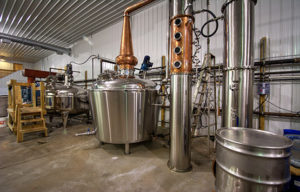In late 2017, Congress passed the Craft Beverage Modernization and Tax Reform Act (CBMTRA) as part of the Tax Cuts and Jobs Act of 2017. The CBMTRA cut the Federal Excise Tax (FET) on distilled spirits from $13.50 a proof gallon to $2.70 a proof gallon for the first 100,000 proof gallons (approximately 52,631 9-liter cases of 80 proof spirits) removed from bond for consumption or sale in 2018 or 2019.
The rules for distilleries to qualify for the reduced FET are fairly straightforward. To take advantage of the reduced FET on their first 100,000 proof gallons removed from bond in 2018 and 2019, a distillery must distill or process those spirits. TTB’s definition of “process” is somewhat broad, but includes mixing, rectifying, and bottling. Therefore, a distillery who purchases whiskey or vodka in bulk, and bottles it at their facility, should be eligible to pay the lower FET rate, provided they have not removed more than 100,000 proof gallons in the current calendar year, and the current calendar year is either 2018 or 2019.

While APs may look like a perfect solution for spirits brand owners who do not have the resources or time to open their own distilleries, there are several obstacles to obtaining an AP. First, establishing an AP takes several months and involves a fair amount of paperwork. The tenant DSP must submit a full DSP application to TTB, which can take 60 to 90 days for approval (a state distillery license may also be required). Then the tenant DSP needs to get TTB label and/or formula approval for each of its products under its own DSP, which in turn may require new or revised brand registrations for each state where their products are sold. Second, some co-packers may not be willing to operate an AP at their facility. APs create additional complexity and costs for the host, as they will be essentially operating two (or more) DSPs at the same time. Third, there are several states, including Ohio and North Carolina, that do not allow two separate entities to be licensed at a single location or do not recognize APs for distilleries, which effectively forecloses the opportunity to operate as an AP in those states.
Because the tax relief offered by the CBMTRA may be short-lived (currently, it does not extend past 2019), distilleries and spirits brand owners should act quickly to confirm they can and do qualify for the lower FET rate, and maximize their potential savings. Please contact John Messinger for more information on this topic.

